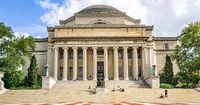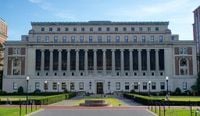Columbia University has agreed to pay more than $220 million to the Trump administration in a landmark settlement aimed at restoring federal research funding that was previously cut due to allegations of inadequate action against antisemitism on campus. The Ivy League institution will pay a $200 million settlement over three years to the federal government, along with an additional $21 million to resolve claims of civil rights violations against Jewish employees following the Hamas attack on Israel on October 7, 2023.
Acting University President Claire Shipman described the agreement as "an important step forward after a period of sustained federal scrutiny and institutional uncertainty." She emphasized that the settlement was carefully crafted to protect Columbia's core values and preserve its academic independence, allowing the university’s vital research partnership with the federal government to resume. Earlier in 2025, Columbia had faced the suspension of over $400 million in federal grants, a move that threatened billions in government support, including a majority of its $1.3 billion annual federal funding.
The funding suspension originated from the Trump administration’s concerns about Columbia’s handling of antisemitism during campus protests sparked by the Israel-Hamas conflict. Columbia’s own antisemitism task force, established to assess the campus climate, documented verbal abuse, ostracism, and classroom humiliation directed at Jewish students during demonstrations in spring 2024. However, the situation was complex, as some Jewish students participated in the pro-Palestinian protests, with leaders maintaining their criticism targeted Israeli government policies rather than Jewish people broadly.
Under the terms of the settlement, Columbia has committed to a comprehensive set of reforms. These include overhauling student disciplinary processes and applying a federally endorsed definition of antisemitism not only to teaching but also to disciplinary committees investigating students critical of Israel. The university agreed to review its Middle East curriculum to ensure it is "comprehensive and balanced" and to appoint new faculty to its Institute for Israel and Jewish Studies.
Significantly, Columbia pledged to end programs that promote "unlawful efforts to achieve race-based outcomes, quotas, diversity targets or similar efforts," a move that could affect several departments, fellowships, and diversity, equity, and inclusion (DEI) initiatives. The university will also submit regular reports to a federal monitor confirming that its programs do not promote unlawful DEI goals. This monitor, Bart M Schwartz, co-founder of an organization dedicated to aiding Israel’s recovery, will provide biannual reports to ensure compliance.
In addition, the agreement prohibits Columbia from implementing affirmative action in its admissions policies and requires the university to reduce its dependence on international students. It also obligates Columbia to provide, upon request, detailed information about disciplinary actions involving student visa holders, including expulsions, suspensions, and arrest records. This could potentially facilitate the Trump administration’s efforts to deport students involved in protests.
Columbia has already taken stern measures against student activism, suspending, expelling, or revoking degrees from more than 70 students who participated in pro-Palestinian demonstrations, including a notable protest in the main library in May 2025 and an encampment during alumni weekend in 2024. Suspensions range from one to three years and require apology letters for readmission.
Education Secretary Linda McMahon hailed the settlement as "a seismic shift in our nation’s fight to hold institutions that accept American taxpayer dollars accountable for antisemitic discrimination and harassment." She described Columbia’s reforms as "a roadmap for elite universities that wish to regain the confidence of the American public by renewing their commitment to truth-seeking, merit, and civil debate." Brian Cohen, executive director of the Kraft Center for Jewish Student Life at Columbia/Barnard Hillel, also praised the agreement as an important recognition of the reality and impact of antisemitism on campus.
President Donald Trump celebrated the deal on his Truth Social platform, declaring it "a great honor to have been involved" and thanking Secretary McMahon and others who worked on the agreement. Trump emphasized Columbia's commitment to ending "ridiculous DEI policies," admitting students based solely on merit, and protecting civil liberties. He warned that "numerous other Higher Education Institutions that have hurt so many, and been so unfair and unjust, and have wrongly spent federal money" would face similar scrutiny and consequences.
The settlement resolves multiple federal agency investigations and codifies changes Columbia had already begun implementing, such as enhanced campus safety measures and disciplinary reforms. The university, however, firmly denies any admission of wrongdoing, with Shipman stating that Columbia does not agree with the government’s conclusion that it violated Title VI of the Civil Rights Act but acknowledges the "very serious and painful challenges our institution has faced with antisemitism." She stressed that the federal government will not dictate faculty hiring, admissions decisions, or academic content, affirming that Columbia’s governance remains under its own control.
Columbia’s agreement also includes the establishment of a whistle-blower hotline for reporting complaints, and the appointment of an independent monitor to oversee compliance with the settlement terms. This deal marks a significant milestone as Columbia is the first university to reach such a negotiated settlement over antisemitism claims under the Trump administration, which has also frozen over $2 billion in federal research funding at other prestigious institutions including Cornell, Northwestern, Brown, and Princeton.
Other universities have responded differently. Harvard University, for example, has defied the administration’s demands and filed a lawsuit challenging the funding cuts, a case that remains pending. Meanwhile, the administration continues to exert pressure on higher education institutions, with investigations and leadership changes occurring at public universities like the University of Virginia and George Mason University over their DEI practices.
The Columbia settlement thus sets a precedent in the ongoing national debate over campus free speech, antisemitism, and the role of diversity initiatives in higher education. It reflects a broader campaign by the Trump administration to reshape university policies through the leverage of federal funding, targeting institutions perceived as fostering environments hostile to Jewish students or promoting policies deemed discriminatory against certain groups.
As Columbia moves forward with these reforms and the restoration of its federal grants, the university community and the broader academic world will be closely watching the impact of this agreement on campus climate, academic freedom, and the balance between combating discrimination and preserving open discourse.


